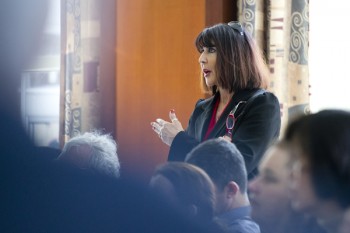The budget for the next fiscal year beginning July 1 will advance Northeastern’s commitment to undergraduate and graduate education, research, student life and support services, and ongoing improvements to its physical and technological resources, the university’s top financial officer said Wednesday during an annual budget briefing to the Faculty Senate .
“The real message is that we’re operating from a position of strength,” said Thomas Nedell, vice president and chief financial officer . “We’re on an upward slope on so many metrics. It’s a positive story for us, and we can all take some credit for that. The financial strength of this university really depends on its academics, so we really have you, the faculty, to thank.”
The budget, which includes an unprecedented $204 million in financial aid , would create new tenure-track faculty positions. The budget will also support the development of new graduate, professional, and PhD programs and expand the new University Scholars Program—which is anticipated to draw to campus a new class of 75 top achieving first-year students. Campus and student life improvements contained in the new budget include further expansion of the Snell Library’s new Digital Media Commons and additional space across campus where students can study and collaborate.
Philomena Mantella, the senior vice president for enrollment management and student affairs , explained that the budget includes a modest 3.7 percent tuition increase, coupled with a 9 percent increase in financial aid.
“There’s no greater time than now, with the scrutiny on higher tuition, to think about how we look comparatively to our overlap schools and the top 50 universities,” Mantella said. “We try to position our price slightly below the mean of those two groups to keep tuition from escalating beyond a reasonable rate.”

Philomena Mantella is the senior vice president for enrollment management and student affairs. Photo by Brooks Canaday.
At the meeting, Mantella also discussed the new White House College Scorecard, an interactive tool that incorporates data about individual colleges and universities in areas like costs, graduation rate, and average amount borrowed. The scorecards have drawn a significant level of media attention since being unveiled earlier this year.
Mantella acknowledged that Northeastern’s scorecard indicated a higher net price compared with other universities in the area and in its cohort. However, she said the scorecard did not reflect the recent reductions in net price the university has accomplished in recent years. She added that it also does not yet provide information about job placement, which is one of Northeastern’s strengths. Ultimately, it is one of many tools that prospective students use when weighing their own college decision, she said.
Other Faculty Senate business at the meeting included a vote to approve the creation of two new master’s degree programs: one is a game science and design program created collaboratively by the College of Arts, Media, and Design and the College of Computer and Information Science , and the other in regulatory affairs of food and food industries developed by the College of Professional Studies .